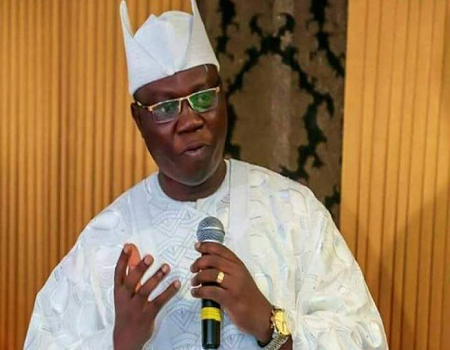The Aare Onakakanfo of Yorubaland, Iba Gani Adams, has called on Federal Government to adopt a new power generation strategy to boost power supply and encourage the youths on capacity building, asserting that the power sector had the potentials to change the poor narratives of Nigeria’s economy.
Iba Adams made the call when the Nigerian Institute of Building (NIOB) paid him a courtesy visit at his Omole Phase 2 residence in Lagos, even as he said there was the need to reorientate the Nigerian youths on the need to cultivate new capacity development culture, by learning various vocational training in order to build prosperous careers.
The NIOB team, led by its national president, Builder Kunle Awobodun, had visited the Aare Ona Kakanfo to seek his blessings and advice on national security and other relevant issues.
Iba Adams, who lamented that Nigeria’s socio-economic problem began in the 80s, with inadequate power supply, admitted also that the negative paradigm shift and focus on university education certificate without technical skill acquisition also affected the entire nation, urging the federal and state governments to redirect their attention in that line.
“Inadequate power supply is a fundamental problem. When there is stable power, the economy will be stable for innovative ideas.
“We say there are no jobs, our youths are not employable with their certificates, yet foreigners have taken over our construction companies, and other areas.
“None of our countrymen can compete with them because we have lost touch with what is necessary across all sectors.
“The Federal Government, as well as the state government, must create an educational institute for technical development,” he said.
ALSO READ: Kwara hosts security dialogue Thursday
“We also need to re-orientate the youths on the need to acquire practical- based knowledge and jobs.
“We need secondary and university for technical schools, at least, four in each of the local governments in each state. We need to add value to the lives of our youths. They need to learn about technical jobs. This is the future of great nations,” he added.
Adams, who informed that he started his life as an artisan, however, admitted that the reduction in the number of artisans, and experts had increased the number of political thugs in Nigeria, declaring that people were no longer interested in becoming apprentices but in making quick money, a development he said had affected the economy adversely, making the country now to source for best artisans and builders from Togo, the Republic of Benin and other African countries.
“People no longer interested in becoming an apprentice. They want to make quick money and that is affecting the economy adversely
and sadly, the best artisans, builders are from Togo, Republic of Benin and other African countries,” the Aare said.
Adams, however, urged the group to embark on aggressive mobilisation, stressing that the group had the potentials to build a formidable structure that could be used to project the group’s image.
Responding, NIOB President, Awobodun said the group had made a tremendous impact in ensuring the construction of quality and standard buildings across the country, describing NIOB as a group with great strength and a national outlook, with structure across all the states in the country.
Awobodun, who sought the support of the Aareonakakanfo in ensuring effective security of members across the country, expressed concern on the increasing cases of building collapse across the land, saying NIOB had made concerted efforts to ensure safety by having construction done, using quality building materials that can endure the test of time.
He, however, disclosed that NIOB would soon embark on a sensitization rally to tell the world about the activities of the group, adding: “We are organising a sensitization rally on March 16 to tell the world about our various activities.”
Some of the members of the group that visited the Aare Onakakanfo included: Builders Modupe Ogunbanjo, Femi Ishola, Jane Ogbu, Prince Adesegun Banjoko, Comrade Anthony Aluko, Oyebamji Dauda and Adesina Ogunkoya, among others.




